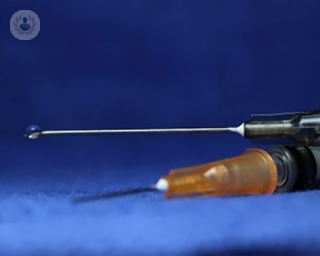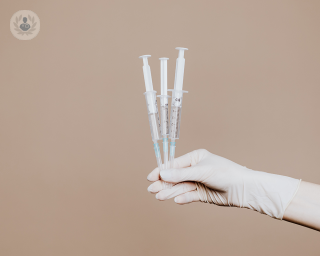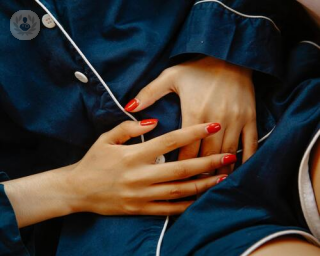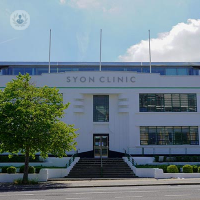What is urinary incontinence?
Urinary incontinence is the involuntary leaking of urine, and it occurs more often in women than in men. Some women may find a few drops of urine are let out while running, or coughing, while others may have a strong urge to urinate over a long period of time.

There are two main types of urinary incontinence: stress incontinence and urge incontinence.
The more common of the two is stress incontinence, which is said to affect up to one in every four women. Women's chances of experiencing stress incontinence increases if they have previously given birth. Stress incontinence is characterised by an involuntary loss of urine upon physical exercise or physical exertion.
Urge incontinence is less common, affecting roughly one in every 13 women, and is typically characterised by an intense urgency to pass urine and the inability to delay the passing of urine.
Mixed incontinence may be experienced by some women when they suffer from both loss of urine when physically exerting themselves and a desperate need to pass urine. This can occur in one in 20 women.
What are the main causes of urinary incontinence in women?
There are many causes of both stress incontinence and urge incontinence in women. The main causes of stress incontinence include:
- loss of pelvic floor ligament and muscle support
- loss of sphincter strength and support
The main cause of urge incontinence is overactive bladder syndrome.
What are the main risk factors for women?
The main risk factor is age. Unfortunately, the older women become, the more likely they are to experience urinary incontinence. In fact, research has shown that up to one in every two women over the age of 70 suffers from some form of urinary incontinence. Other risk factors include obesity, a family history of urinary incontinence, and previous vaginal birth.
How is urinary incontinence in women treated?
Firstly, there are many non-surgical methods of treating urinary incontinence in women that one's GP will advise to see if symptoms improve. These include the following:
- lifestyle changes, such as consuming less alcohol
- pelvic floor exercises (where a woman will learn how to strengthen her pelvic muscles by squeezing them)
- bladder training
- absorbent pads
- medicine
There are then a wide variety of different surgical options for both types of urinary incontinence in women. The main surgical procedures that can help treat stress incontinence include:
- colposuspension
- sling surgery
- vaginal mesh surgery (this is no longer recommended in the UK)
- urethra bulking agent
- artificial urinary sphincter
The main surgical procedures for urge incontinence, then, include the following:
- botulinum toxin A injections
- sacral nerve stimulation
- posterior tibial nerve stimulation
- augmentation cystoplasty
- urinary diversion
Urinary incontinence in women
What is urinary incontinence?
Urinary incontinence is the involuntary leaking of urine, and it occurs more often in women than in men. Some women may find a few drops of urine are let out while running, or coughing, while others may have a strong urge to urinate over a long period of time.

There are two main types of urinary incontinence: stress incontinence and urge incontinence.
The more common of the two is stress incontinence, which is said to affect up to one in every four women. Women's chances of experiencing stress incontinence increases if they have previously given birth. Stress incontinence is characterised by an involuntary loss of urine upon physical exercise or physical exertion.
Urge incontinence is less common, affecting roughly one in every 13 women, and is typically characterised by an intense urgency to pass urine and the inability to delay the passing of urine.
Mixed incontinence may be experienced by some women when they suffer from both loss of urine when physically exerting themselves and a desperate need to pass urine. This can occur in one in 20 women.
What are the main causes of urinary incontinence in women?
There are many causes of both stress incontinence and urge incontinence in women. The main causes of stress incontinence include:
- loss of pelvic floor ligament and muscle support
- loss of sphincter strength and support
The main cause of urge incontinence is overactive bladder syndrome.
What are the main risk factors for women?
The main risk factor is age. Unfortunately, the older women become, the more likely they are to experience urinary incontinence. In fact, research has shown that up to one in every two women over the age of 70 suffers from some form of urinary incontinence. Other risk factors include obesity, a family history of urinary incontinence, and previous vaginal birth.
How is urinary incontinence in women treated?
Firstly, there are many non-surgical methods of treating urinary incontinence in women that one's GP will advise to see if symptoms improve. These include the following:
- lifestyle changes, such as consuming less alcohol
- pelvic floor exercises (where a woman will learn how to strengthen her pelvic muscles by squeezing them)
- bladder training
- absorbent pads
- medicine
There are then a wide variety of different surgical options for both types of urinary incontinence in women. The main surgical procedures that can help treat stress incontinence include:
- colposuspension
- sling surgery
- vaginal mesh surgery (this is no longer recommended in the UK)
- urethra bulking agent
- artificial urinary sphincter
The main surgical procedures for urge incontinence, then, include the following:
- botulinum toxin A injections
- sacral nerve stimulation
- posterior tibial nerve stimulation
- augmentation cystoplasty
- urinary diversion


Bulkamid® injections: treating urinary incontinence in women
By Mr Aza Mohammed
2024-12-26
Most traditional treatments for women suffering urinary incontinence bring on unwanted side-effects discouraging many from getting the help they need. Recently, however, a new, minimally invasive procedure with less complications has caught everyone's attention: Bulkamid® injections. See more


Bulkamid injections for stress urinary incontinence: how do they work?
By Mr Keng Jin Ng
2024-12-26
Stress urinary incontinence is a common condition among women as they age, causing urine to leak out during the day. Fortunately, a new procedure known as Bulkamid is now available to treat this and allow you to regain control of your life. Mr Keng Jin Ng, a top consultant urological surgeon based in London, explains more. See more


All about vaginal prolapse treatment
By Dr Vladimir Revicky
2024-12-26
There are various treatments for vaginal prolapse available. Find out more in this in-depth article by leading consultant urogynaecologist Dr Vladimir Revicky. See more


A comprehensive insight into urinary tract infections (UTIs)
By Dr Aneta Obloza
2024-12-26
Urinary tract infections (UTIs) are common bacterial infections affecting the urinary system, causing pain and discomfort if left untreated. Here, Dr Aneta Obloza, renowned consultant urogynaecologist in Leicester, offers her expert insight into UTIs, including symptoms, treatment and prevention. See more
Experts in Urinary incontinence in women
-
Mr Keng Jin Ng
UrologyExpert in:
- Laser lithotripsy
- Cystitis
- Urinary incontinence in women
- Female urology
- Prostatitis
- Prostate cancer
-
Mr Rajesh Kavia
UrologyExpert in:
- Urinary incontinence
- Prostate
- Bladder problems
- Urinary tract infection
- Paediatric urology
- Urinary incontinence in women
-
Mr Moeketsi Mokete
UrologyExpert in:
- Kidney stones
- Benign prostate enlargement
- Urinary tract infection
- Scrotal swelling
- Vasectomy
- Urinary incontinence in women
-
Mr Rajesh Nair
UrologyExpert in:
- Bladder cancer
- Prostate cancer
- Haematuria (blood in the urine)
- Overactive bladder
- Penile Prosthesis
- Urinary incontinence in women
-
Mr Nicholas Faure Walker
UrologyExpert in:
- Benign prostate enlargement
- Overactive bladder
- Urinary incontinence in women
- Urinary tract infection
- Stress incontinence
- Prostate
- See all

Syon Clinic - part of Circle Health Group
Syon Clinic - part of Circle Health Group
941 Great West Rd, Brentford TW8 9DU
No existe teléfono en el centro.
By using the telephone number provided by TOP DOCTORS, you automatically agree to let us use your phone number for statistical and commercial purposes. For further information, read our Privacy Policy
Top Doctors

The Princess Grace Hospital - part of HCA Healthcare
The Princess Grace Hospital - part of HCA Healthcare
The Princess Grace Hospital, 42-52 Nottingham Pl, W1U 5NY
No existe teléfono en el centro.
By using the telephone number provided by TOP DOCTORS, you automatically agree to let us use your phone number for statistical and commercial purposes. For further information, read our Privacy Policy
Top Doctors

London Bridge Hospital - part of HCA Healthcare
London Bridge Hospital - part of HCA Healthcare
27 Tooley St
No existe teléfono en el centro.
By using the telephone number provided by TOP DOCTORS, you automatically agree to let us use your phone number for statistical and commercial purposes. For further information, read our Privacy Policy
Top Doctors
-
Syon Clinic - part of Circle Health Group
941 Great West Rd, Brentford TW8 9DU, West LondonExpert in:
- Allergies nose and ears
- Allergy Dermatitis
- Allergy
- Clinical analysis
- Anxiety
- Digestive
-
The Princess Grace Hospital - part of HCA Healthcare
The Princess Grace Hospital, 42-52 Nottingham Pl, W1U 5NY, Central LondonExpert in:
- Cancer
- General Surgery
- Orthopaedic surgery
- Robotic Surgery
- Intensive care
- Sports Medicine
-
London Bridge Hospital - part of HCA Healthcare
27 Tooley St, Central LondonExpert in:
- 24-hour service
- Cardiology
- Minimal access surgery (keyhole surgery)
- Orthopaedic surgery
- Cardiovascular disease
- Gastroenterology
- See all
- Most viewed diseases, medical tests, and treatments
- Fertility preservation
- Female infertility
- Undescended testicle (Cryptorchidism)
- Testicular ultrasound
- Minimal access surgery (keyhole surgery)
- NanoKnife
- Vaginal dryness
- Pelvic pain syndrome
- Kidney stones
- Medicolegal







